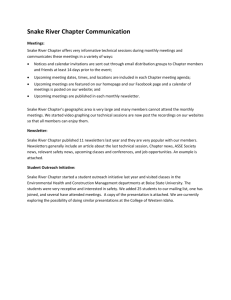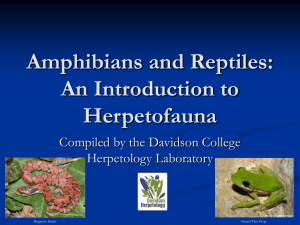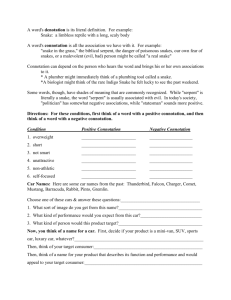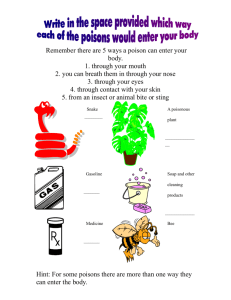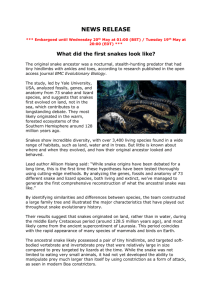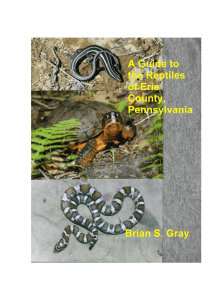04 Reptile and Amphibian Unit Exam
advertisement
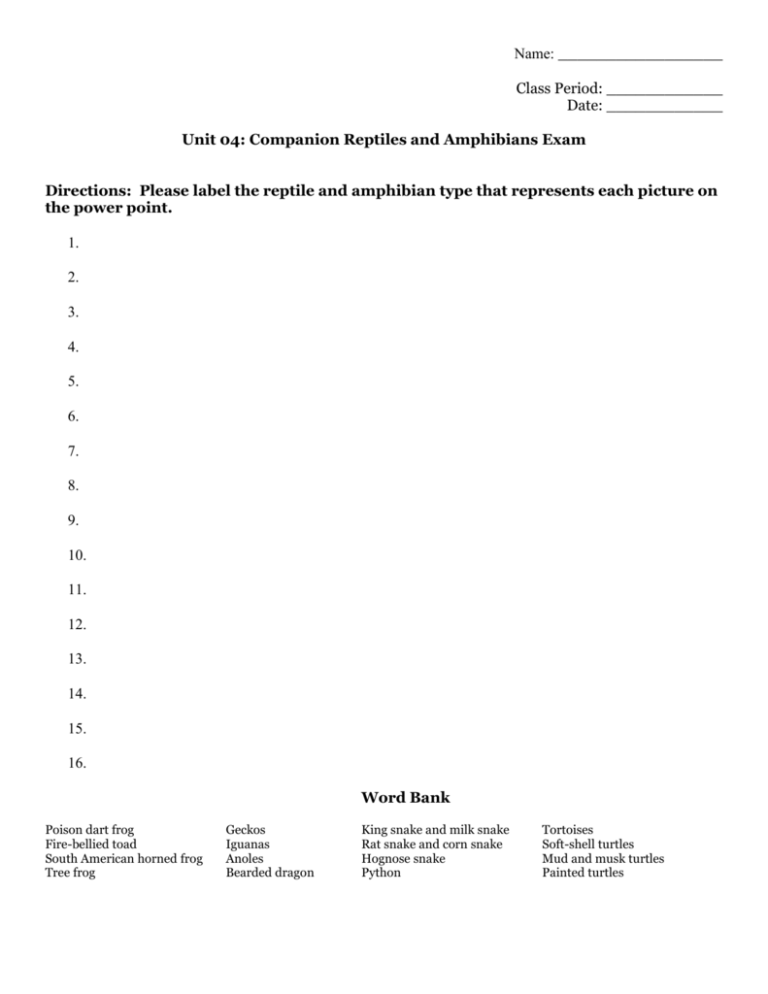
Name: _________________ Class Period: ____________ Date: ____________ Unit 04: Companion Reptiles and Amphibians Exam Directions: Please label the reptile and amphibian type that represents each picture on the power point. 1. 2. 3. 4. 5. 6. 7. 8. 9. 10. 11. 12. 13. 14. 15. 16. Word Bank Poison dart frog Fire-bellied toad South American horned frog Tree frog Geckos Iguanas Anoles Bearded dragon King snake and milk snake Rat snake and corn snake Hognose snake Python Tortoises Soft-shell turtles Mud and musk turtles Painted turtles Frogs Directions: Please answer the following questions about frog characteristics, biology and behavior, husbandry, common diseases, and zoonoses. 17. This type of frog is strictly aquatic, will eat anything that fits in it’s mouth, common in pet trade, has a life span of 15 years, and can reach the size of 5 to 6 inches. According to these characteristics, which frog is this describing? A. B. C. D. Leopard frog Bullfrogs African clawed frog South American horned frogs 18. Frogs undergo a process, in which they begin life as a tadpole with no limbs, tail, and they breathe through gills. Then the tadpoles change and grow limbs, a tail, and their gills become lungs. What correctly identifies this process? A. B. C. D. genealogy metamorphosis puberty life cycle Directions: Different types of frogs require different types of enclosures. Please match the appropriate enclosure to each type of frog. 19. ___________Slightly slanted floor or combined “pond” and substrate. 20. ____________Solid, moist surface and a water dish or “pond”. 21. ____________Static, flow-through, or recirculating system. A. Aquatic frogs B. Terrestrial frogs C. Semi aquatic frogs 22. This zoonotic disease colonizes internal organs of African clawed frogs and can be treated with doxycycline. What is the name of this disease? A. B. C. D. Redleg Lucke tumor herpesvirus Chlamydophila psittaci Fungi Snakes Directions: Please answer the following questions about snake characteristics, biology and behavior, husbandry, common diseases, and zoonoses. 23. This snake is generally natives of Central and South America, considered one of the most popular snakes, and tames quickly. It also can be bred in captivity, grows up to 12 feet, females are larger than males, and they are livebearers. According to these characteristics, which snake is this describing? A. B. C. D. Python King Snake and milk Snake Garter Snake Boa 24. Snakes shed their skin as a single piece, including its spectacles. What is this process known as? A. B. C. D. Metamorphosis Ecdysis Molting Shedding 25. Temperature is very important with snakes. If the ambient temperature is too cold, snakes will not _______________. A. B. C. D. live shed drink eat 26. What are the three main health concerns with snakes? A. B. C. D. parasites, toxicosis, infectious stomatitis salmonella, gout, toxicosis thermal burns, gout, obesity thermal burns, parasites, salmonella 27. Snakes can carry diseases that can infect humans if they come in contact with these snakes. This is known as zoonoses. What zoonoses can the handler develop localized dermatitis from? A. B. C. D. snake mites salmonella gout inclusion body disease Lizards Directions: Please answer the following questions about lizard characteristics, biology and behavior, husbandry, common diseases, and zoonoses. 28. These are fairly large terrestrial lizards that can grow up to 4 feet long and can live 15 to 20 years. They are known as being aggressive and are not recommended for beginners. According to these characteristics, which lizard does this describe? A. B. C. D. Monitors Tegus Skinks Water dragon 29. Which one of these actions is a common predator avoidance mechanism for lizards? A. B. C. D. flight tail autonomy camouflage play dead 30. In order to provide a proper enclosure for snakes, it is suggested that the owner place PVC pipe, heat-treated bark, or broken terra cotta inside the snake’s cage. Owners should do this in order to provide what for their snake? A. B. C. D. chew toy climbing capabilities warmth retreat 31. One common disease of snakes known as “mouth rot” is a bacterial infection that is secondary to stress and immunosuppression. Poor husbandry increases the snake’s chances of getting this disease and in order to treat it, surgical removal of the infected tissue is required. If it is not treated, the snake’s lesions can progress to ulcerations and abscesses causing some animals to loose teeth. What common disease is this most likely describing? A. B. C. D. Amoebiasis Cryptosporidiosis Infectious stomatitis Adenovirus Turtles Directions: Please answer the following questions about turtle characteristics, biology and behavior, husbandry, common diseases, and zoonoses. 32. This turtle is known for having a domed shell with hinged plastron and is able to totally withdraw its head and limbs. According to these characteristics, what turtle does this most closely describe? A. B. C. D. Native box turtles Asian box turtle Map turtles Soft-shell turtles 33. The ____________ on a turtle is fused to the vertebrae and ribs and is comprised of osteoderms (bony plates). Using the answer choices below, please correctly complete the statement above. A. B. C. D. skin tail head shell 34. This disease is common in box turtles and can cause the turtles to become anorexic. A variety of bacteria is thought to be involved in causing this disease and treatment involves perforating the eardrum and flushing the middle ear with antiseptic. According to this description, what common disease does this most closely describe? A. B. C. D. Respiratory tract infection Middle-ear infection Metabolic bone disease Vitamin A deficiency 35. Salmonella is a type of zoonoses that turtles can have and it is shed in their feces. Gloves should be worn when handling or caring for these turtles and some people such as very young children or pregnant women should avoid handling these turtles completely. Where in the turtle is this zoonosis carried? A. B. C. D. Respiratory tract Digestive tract Reproductive tract Circulatory tract


